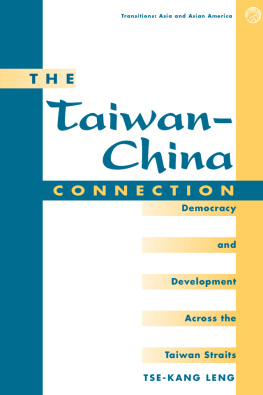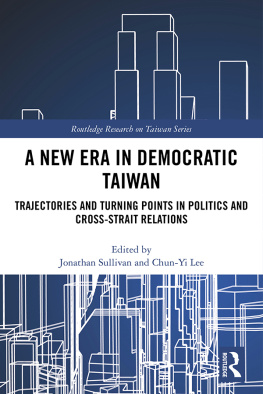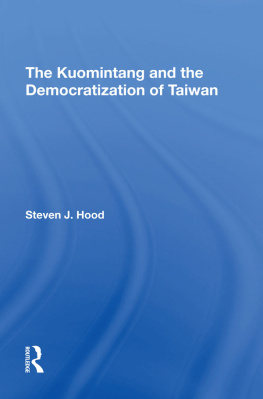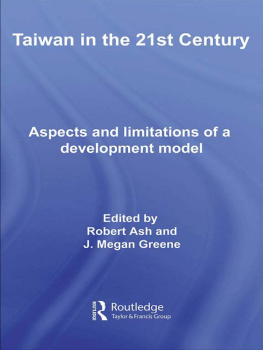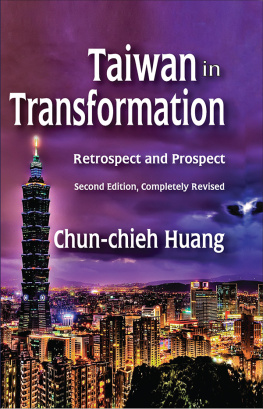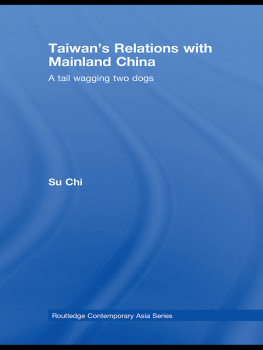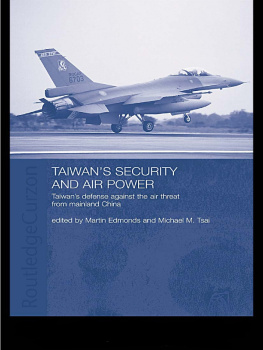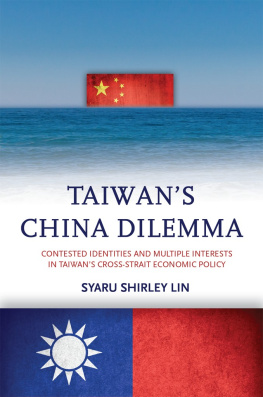The Taiwan-China Connection
Transitions: Asia and Asian America
Series Editor, Mark Selden
The Taiwan-China Connection: Democracy and Development Across the Taiwan Straits, Tse-Kang Leng
Trade and Transformation in Korea, 18761945, Dennis L. McNamara
Hidden Horrors: Japanese War Crimes in World War II, Yuki Tanaka
Encountering Macau: A Portuguese City-State on the Periphery of China, 15571999, Geoffrey C. Gunn
How the Farmers Changed China: Power of the People, Kate Xiao Zhou
From Plan to Market: The Economic Transition in Vietnam, Adam Fforde and Stefan de Vylder
Japanese Colonialism in Taiwan: Land Tenure, Development, and Dependency, 18951945, Chih-ming Ka
A "New Woman" of Japan: A Political History of Kat Shidzue, Helen M. Hopper
Vietnam's Rural Transformation, edited by Benedict J. Tria Kerkvliet and Doug J. Porter
The Origins of the Great Leap Forward: The Case of One Chinese Province, Jean-Luc Domenach
Privatizing Malaysia: Rents, Rhetoric, Realities, edited by Jomo K. S.
The Politics of Democratization: Generalizing East Asian Experiences, edited by Edward Friedman
Out Land Was a Forest: An Ainu Memoir, Kayano Shigeru
The Political Economy of China's Financial Reforms: Finance in Late Development, Paul Bowles and Gordon White
Reinventing Vietnamese Socialism: Doi Moi in Comparative Perspective, edited by William S. Turley and Mark Selden
The Taiwan-China Connection
Democracy and Development Across the Taiwan Straits
Tse-Kang Leng
Transitions: Asia and Asian America
First published 1996 by Westview Press
Published 2018 by Routledge
711 Third Avenue, New York, NY 10017, USA
2 Park Square, Milton Park, Abingdon, Oxon OX14 4RN
Routledge is an imprint of the Taylor & Francis Group, an informa business
Copyright 1996 Taylor & Francis
All rights reserved. No part of this book may be reprinted or reproduced or utilised in any form or by any electronic, mechanical, or other means, now known or hereafter invented, including photocopying and recording, or in any information storage or retrieval system, without permission in writing from the publishers.
Notice:
Product or corporate names may be trademarks or registered trademarks, and are used only for identification and explanation without intent to infringe.
Library of Congress Cataloging-in-Publication Data
Leng, Tse-Kang.
The Taiwan-China connection: democracy and development across the
Taiwan Straits / Tse-Kang Leng.
p. cm.(TransitionsAsia and Asian America)
Includes bibliographical references and index.
ISBN 0-8133-2982-5.ISBN 0-8133-9006-0 (pbk.)
1. TaiwanEconomic policy1975 2. TaiwanPolitics and
government1988 3. TaiwanForeign economic relationsChina.
4. ChinaForeign economic relationsTaiwan. I. Title.
II. Series.
HC430.5.L453 1996
338.95124'9dc20 96-8991
CIP
ISBN 13: 978-0-8133-9006-2 (pbk)
To my parents
This book is based on my Ph.D. dissertation, submitted to the University of Virginia (UVA) in 1995. I am indebted to many individuals at every stage of work on the manuscript. Special thanks go to Professor Brantly Womack, my dissertation advisor, for his guidance and encouragement. Ever patient and ready to share his insights, Professor Womack guided me into the academic world and taught me how to be a true "scholar." Professor and Mrs. Shao-chuan Leng, my foremost laoshi and shimu, gave me all the help I needed as a foreign student in the United States. Their character and generosity provided me with a true role model. Professor Kenneth W. Thompson, my mentor in theories of international relations, also provided me with endless support during the years I spent at UVA. Professor John Shepherd, a brilliant anthropologist, gave me insight into an area other than my own subject of political science.
I am also grateful to the friends I made during my four years of study at UVA. I owe a special debt to Mr. and Mrs. John Flachmeyer, my family hosts in Charlottesville. Mr. Flachmeyer carefully read the original draft and corrected the grammatical errors. Mrs. Flachmeyer, sadly passed away two months after we left the "uplands," but my wife and I will always cherish the memory of her warm hospitality. Miss Chung-ming Lung of the East Asian Division of the Alderman Library was kind enough to offer me a part-time job when my finances became strained. Another friend in Charlottesville I am particularly grateful to is Mr. Charlie Chihpin Tu.
In Taiwan, many thanks go to Professor Milton D. Yeh and Dr. Yujen Chou, who have given me many valuable suggestions since I started preparing this book. My teachers at National Chengchi University including Professor Yu-hsien Long, Bih-jaw Lin, Kuo-hsiung Lee, Chi Su, I-chou Liu, and Jyh-pin Fa provided me with very useful advice and encouragement. My appreciation also goes to Ms. Judith Fletcher of the Institute of International Relations, who has kindly proofread and revised the prose of the original draft under the pressure of an approaching submission date.
In addition, I am pleased to record my very special thanks to Professor Mark Selden, the series editor, for his comments on the original manuscript. This book would not have been published without his insightful suggestions and recommendations. I would also like to thank Susan McEachern and Melanie Stafford at Westview Press for their assistance during the preparation of the book. Needless to say, despite the generous assistance I have received, I remain responsible for all the opinions I put forward.
This book is dedicated to my parents. They rebuilt a family in Taiwan during the island's most impoverished years and struggled to help their children receive the highest education possible in the United States. Without their material and spiritual support, I would never have been able to complete my studies and write this book.
Finally, I am deeply indebted to my wife, Wenshan, whose boundless devotion and assistance encouraged me to achieve our common goals.
Tse-Kang Leng
Taipei, Taiwan
1
Introduction
Students of comparative politics and international relations will find the recent development of Taiwan an interesting case to test the validity of competing theories of social science. On the one hand, the process of democratization and the transformation of state-society relations challenge the "strong-state paradigm" that has been used to explain the political economy of Taiwan; on the other, Taiwan's flourishing relationship with China requires a new theoretical framework for foreign policy analysis.
The strong-state paradigm is a powerful tool for explaining Taiwan's development over the past forty-some years. Although the neoliberal school of political economy stresses the advantage of laissez-faire policies and dependency theorists emphasize international constraints upon development, the focus of the statist approach is the state's capacity and its autonomy in manipulating the state-society relationship and in initiating foreign economic policies. However, since the process of democratization began, the strong state's dominant role in policymaking has been reduced. Academic works discussing the transitional role of the strong state in initiating economic policies are rare.

